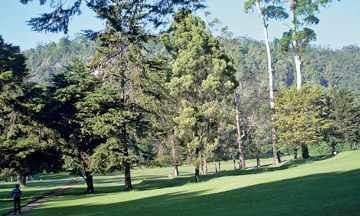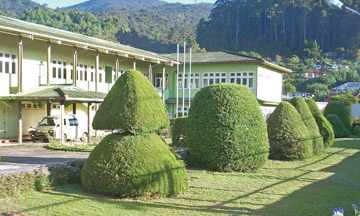|
It’s Christmas time again:
The aroma of Cypress wafts thru' the air
By Ananda Kannangara
|

Cypress plantation in Nuwara Eliya
|
Christmas is celebrated by Christians all over the world. However,
Christmas is incomplete without a Christmas tree-decorating the
Christmas tree is almost a ritual in every Christian home.
Some people trace the origin of the Christmas tree to an earlier
period. Even before the Christian era, trees and boughs were used for
ceremonials. Egyptians, in celebrating the winter solstice - the
shortest day of the year - brought green date palms into their homes as
a symbol of “life triumphant over death”. When the Romans observed the
feast of saturn, part of the ceremony was the raising of an evergreen
bough. The early Scandinavians were said to have paid homage to the fir
tree.
To the Druids, sprigs of evergreen holly in the house meant eternal
life; while to the Norsemen, they symbolized the revival of the sun god
Balder. To those inclined toward superstition, branches of evergreens
placed over the door kept out witches, ghosts, evil spirits and the
like.
This use does not mean that our Christmas tree custom evolved solely
from paganism, anymore than did some of the present-day use of greens in
various religious rituals.
Trees and branches can be made purposeful as well as symbolic. The
Christmas tree is a symbol of a living Christmas spirit and brings into
our lives a pleasant aroma of the forest. The fact that balsam fir
twigs, more than any other evergreen twigs, resemble crosses may have
had much to do with the early popularity of balsam fir used as Christmas
trees.
Children believe that Santa Clause visits their homes on X’mas eve
and hangs gifts on branches of the X’mas tree which is decorated with
colourful lights.
 `Christmas Trees’ are made out of the branches of Cypress trees or
Fir trees. Although, these trees are called by two different names, the
leaves and bark of these triangular shaped trees are similar. `Christmas Trees’ are made out of the branches of Cypress trees or
Fir trees. Although, these trees are called by two different names, the
leaves and bark of these triangular shaped trees are similar.
They grow in evergreen forests in cool Northern countries. The trees
are tall and straight. A unique aroma pervades the air from the fresh
leaves. Cypress plants do not need much water to grow.
In addition to X’mas trees, the leaves of Cypress trees are used to
make bouquets, garlands and wreaths. The `Oxford Dictionary mentions
that people decorate Cypress trees with colourful lights and ornaments
during X’mas season.
In Sri Lanka Cypress plants are mainly grown in Nuwara Eliya,
Bandarawela, Diyatalawa, Matale and Talawakele areas . Among them acres
and acres of Cypress could be seen in the forest ranges of Nuwara Eliya
and Talawakele areas.
After a recent tour of Kimbulapitiya in Negombo to see the cracker
production during this X’mas season , the Sunday Observer last week had
the opportunity of visiting Nuwara Eliya to meet Cypress land owners and
X’mas tree suppliers.
A long standing environmentalist and a journalist in Nuwara Eliya, P.
Rajaratnam said transporting lorry loads of Cypress trees to Colombo and
several other major cities had become a lucrative business of many
persons in Nuwara Eliya during the Christmas season.
He said these trees are commonly seen in the Town Hall area in
Colombo, near Kollupitiya Junction, along the Galle Road in
Bambalapitiya, Moratuwa, Mt. Lavinia, Ratmalana, Negombo and Kandy prior
ten days to the X’ mas festival.
According to Rajaratnam, who has a wide knowledge of Cypress
cultivation, he said unlike in the past, there is a slight decline in
Cypress tree cultivation in Nuwara Eliya due to strict regulations,
imposed by Local Authorities when transporting them to Colombo and other
cities.
He said at present only a few people are engaged in Cypress
transportation during the X’mas festive season.
Many people in Nuwara Eliya in the past sent over 600 lorry loads of
Cypress trees to other areas, but now only a few lorry loads are seen
during this festive season due to restrictions, imposed by local
authorities.
He said whenever a person wants to send even a small stock of cypress
to a relative in Colombo or any other place, he has to get a permit from
the Gramaseva Niladari with the approval of the area Divisional
Secretariat.
Since it is a long process to obtain a permit, many people who were
engaged in transporting cypress trees have stopped even planting them in
nurseries, because they don’t want undergo harassment.
He urged authorities to minimise restrictions, so that people in
Nuwara Eliya and Talawakele will again start planting Cypress in
nurseries and then will transport them to other areas during the X’mas
festive season. Rajaratnam also said many Cypress trees in the Nuwara
Eliya Town area were cut down in the recent past on the instructions of
Local Authorities to beautify the city limits, but later a replanting
program commenced on a directive made by President Mahinda Rajapaksa.
A resident of Nuwara Eliya and a long standing horticulturist,
Piyasena Wedage said Cypress transportation has dropped from 100 percent
to 18 percent due to strict regulations and urged authorities to grant
relief to regular traders, so that lorry loads of Cypress will once
again be transported to Colombo and other major cities from Nuwara
Eliya, and there will also be a healthy cultivation of these trees in
Nuwara Eliya itself. Tars giving Nuwara Eliya the ‘Old feel’ surrounding
the area with its wonderful pungent aroma.
As a horticulturist, he said cutting off branches from Cypress trees
will not affect the trees and more new twigs will come up after few
days.
If people stop cutting branches due to Government restrictions, new
branches will not come up and it affects the trunk of the tree, as
pruning the tree is essential far its survival.
He also said there are many state owned barren lands in Nuwara Eliya
and proposed the Government to encourage people to plant more Cypress
nurseries to increase the number of trees.
He also opposed the destruction of forest lands in Nuwara Eliya for
agricultural and other development purposes, since it will affect to the
existing Cypress forest ranges and also nurseries.
A major X’mas tree transporter of Nuwara Eliya , Rajendra
Thuraisingham asked the authorities to stop transporting lorry loads of
cypress trees to Colombo during the festive season, as it will help only
large scale businessmen to expand their business activities.
He urged the authorities to allow ordinary traders to send small
quantities of Cypress trees, so that everybody could earn money during
this period.
A small scale Cypress cultivator of Talawakele, R. Pathmanthan said
the cutting down of Cypress branches will commence after December 15,
since the leaves wither after 10 days.
A businessman in Nuwara Eliya, Gamalath Peris urged the Government to
stop importing artificial X’mas trees from countries such as China and
Thailand, since it will affect local cypress cultivators and such a
situation will also discourage genuine persons, engaged in the cypress
selling business.
A 48-year old Cypress tree businessman of Nuwara- Eliya, Mohan
Selvaraj said he stopped transporting Cypress trees to Colombo from the
time the Local Authorities imposed strict regulations.
I have now straight dealings with florists and hoteliers in Colombo
and Negombo to provide Cypress trees throughout the year,
He said any amount of Cypress trees could be transported from Nuwara
Eliya during the non-festive season even without permits.
A Cypress nursery owner, Muthu Kulasingham said Cypress cultivation
had earlier become a self-employment project in the District and
cultivators used to plant nurseries in small polythene bags and send
them to Colombo,
He said strict regulations have reduced this home garden project to
20 per cent and asked the Government to refrain from imposing laws to
develop the cypress cultivation.
He also asked the authorities to protect small scale cypress
cultivators from middlemen, so that each X’mas tree could be sold in
Colombo or any other city at a cost of Rs. 200, but now each tree is
sold at Rs. 400- Rs. 600 by traders at present.
Pix: P. Rajaratnam, Nuwara Eliya
Correspondent |

